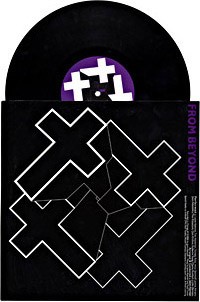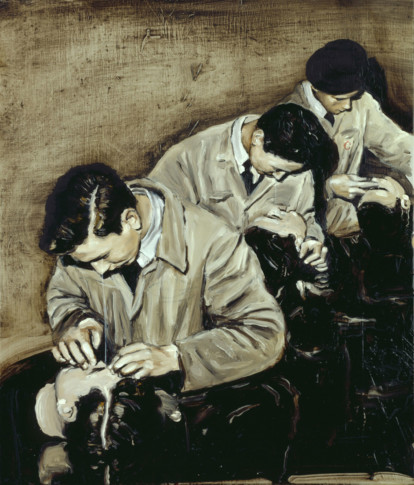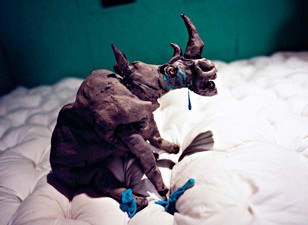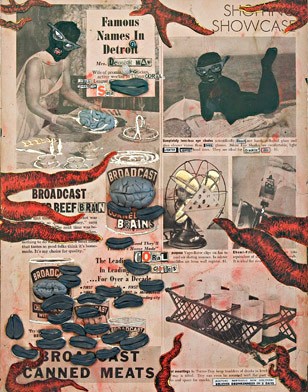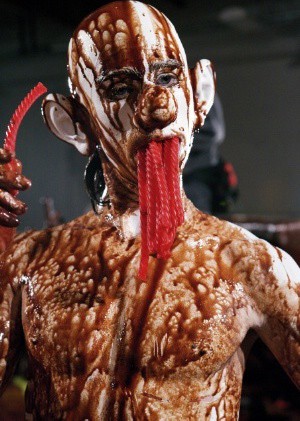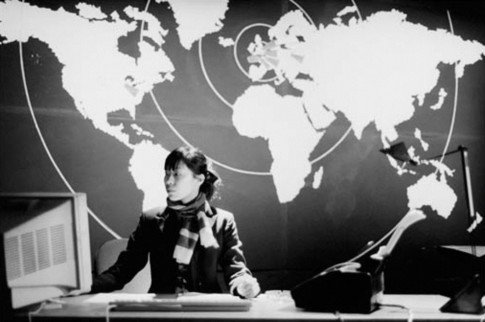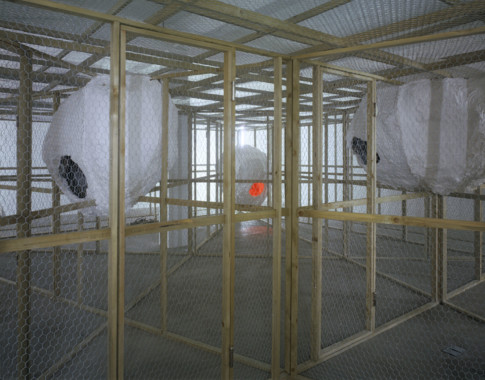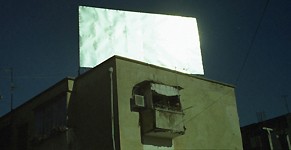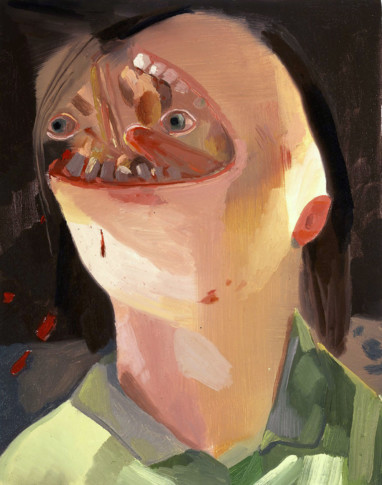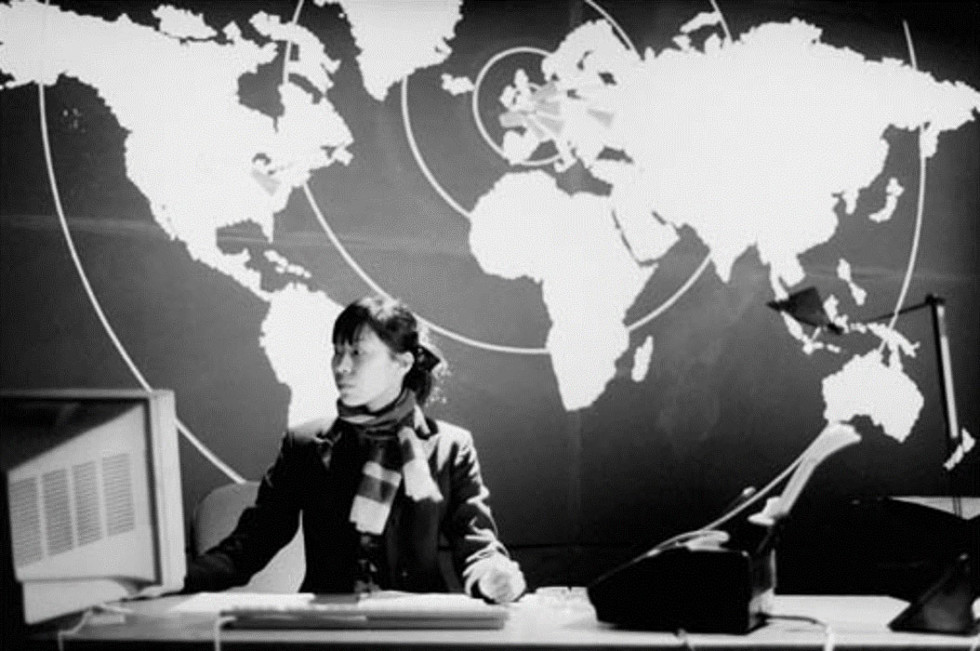
Tom McCarthy, Calling All Agents, 2004 International Necronautical Society (INS) Radio Broadcasting Unit, Institute of Contemporary Arts, London 2004. © David Boulogne/INS
Tom McCarthy
The INS, whose activities have primarily been carried out in the art world, originated in his literary interest:
“It came about because I’d been thinking a lot about death in literature, which has a very long history, both as a theme and as organising structural principle. Greek tragedy is completely configured around death. For example ‘Antigone’: the whole rites of burial, where she’s allowed to bury her dead brother, or not allowed to, demarcate what’s the polis and what’s outside the polis; what’s society, what’s outside society; laws… The whole political and symbolic and sexual and ontological sphere revolves around death.” Consequently, in the first INS manifesto it was stipulated that: “Death is a type of space, which we intend to map, enter, colonise and, eventually, inhabit.”
Structurally, McCarthy’s semi-fictive propaganda organisation is based largely on the historic avant-garde and political organisations and their manifestos, lectures, committees, trials and excommunication of members. This kind of artistic and ideological associations were common in the early 1900s, and in the field of art we could mention Marinetti’s futurist manifesto from 1909, and André Breton’s surrealist manifesto from 1924. People don’t write manifestos any more, and that is why McCarthy finds it interesting to do so now. Today, a manifesto immediately becomes ironic or a pastiche, even though the format retains its rhetoric punch.
Since the start, the INS has held meetings and interrogations at different places around the world to explore its field of interest and to spread its obscure message. In Australia, the organisation gathered and interrogated various “specialists”, resulting in the INS’s second publication: the secretary-general’s report Navigation Was Always a Difficult Art (Vargas Organisation, London 2002). The following year, a new inquiry was held in London, focusing primarily on subjects such as communication, cryptology, transformation, repetition and radio broadcasting. The interrogation, led by McCarthy with assistance from the artist and INS propaganda director Anthony Auerbach and writer Zivony Zinik, took place in a small independent gallery in London. The INS soon after published the document that is reproduced in full in this catalogue: the secretary-general’s second report, Calling All Agents.
Calling All Agents is a fascinating and entertaining text that on the basis of art, life, anthropology and psychoanalysis creates a muddle of associations and far-fetched conclusions on encoded messages and subconscious actions that are suspected of being part of a cipher for “major ongoing events”. In addition to Jean Cocteau’s hero Orphée, the cast in the text includes as disparate characters as Sartre, Tintin, Houdini, Bell, Heidegger, Freud and Hamlet.
On this remarkable journey through literature, the plans are also made for radio broadcasting. An operation of which the first step was performed by the INS Communications and Encodings Subcommittee in its temporary “transmission room” at the Institute of Contemporary Arts in London. At Moderna Museet new transmissions will be carried out based on hidden structures in the local news media. The INS will select parts of messages transmitted by radio, TV and newspapers, combining them in new ways and broadcasting them on a local frequency within the museum.
Parallel with the INS project, Tom McCarthy has published two novels: Remainder, and more recently Men in Space. Remainder is the story of a figure who has a violent accident. On waking up in hospital, paralysed and amnesiac, he is offered a gigantic sum of money in return for never telling anyone about what happened. Since he cannot recall anything, he sees no reason for not accepting the offer. To regain his normal bodily functions he has to learn and practise basic motor skills – such as moving his arms and legs – which means that his new life loses its “naturalness”. After a flashback from the time before the accident, he decides to use the money to recreate, in minute detail and sensation, this “authentic” memory in physical reality, as a stage set, complete with sounds and smells, so he can walk in and out of it.
Remainder was published by the small French publisher Metronome Press in 2005 and was highly acclaimed by the literary world where it has been described as a contemporary classic and was awarded the …. prize.
Fredrik Liew
Tom McCarthy
Born 1969. Lives and works in the UK.
Solo exhibitions
“Greenwich Degree Zero” (med/with Rod Dickinson), History Will Repeat Itself, KW Institute for Contemporary Art, Berlin, 2007
Calling All Agents: INS Broadcasting Unit, ICA, London, 2004
Selected bibliography
Tom McCarthy, Remainder, London: Alma Books 2007 (US: Vintage Books, 2007)
Tom McCarthy, Men in Space, London: Alma Books 2007 (US: Vintage Books, 2009)
Tom McCarthy, Tintin and the Secret of Literature, London: Granta Publications, 2006 (US: Counterpoint, 2008)
Tom McCarthy, Calling All Agents, London: Vargas Organisation, 2003 Tom McCarthy, Navigation Was Always a Difficult Art, London: Vargas Organisation, 2002

